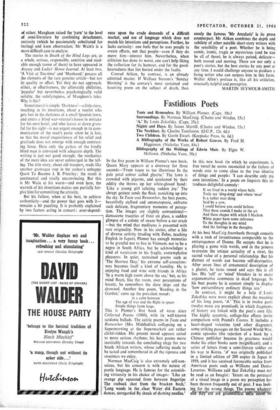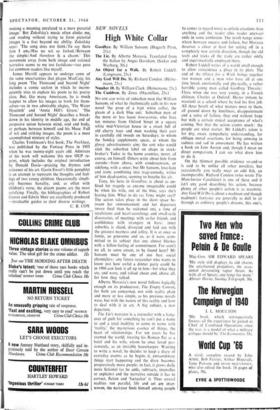Fastidious Poets
Taste and Remember. By William Plomer. (Cape, 18s.)
Surroundings. By Norman MacCraig. (Chatto and Windus, 15s.) 'A.' By Louis Zukofsky. (Cape, 35s.)
Nights and Days. By James Merrill. (Chatto and Windus, 15s.) The Necklace. By Charles Tomlinson. (O.U.P., 12s. 6d.)
Two Children. By Gavin Ewart. (Keepsake Press, 6s. 6d.) A Bibliography of the Works of Robert Graves. By Fred H. Higginson. (Nicholas Vane, 84s.) Bibliography of the Writings of Edwin Muir. By Elgin W. Mellown. (Nicholas Vane, 50s.) IN the first poem in William Plomer's new book, Queen Mary appears at a doorway for three seconds—`From toque to toe illustrious In the pale petal colour called glycine.' The lawn is crowded with pigeons, and quickened by their oddity she throws up her white-gloved hand : `Like a young girl saluting sudden joy.' The abrupt gesture sends the flock panicking up into the sky. In Taste and Remember, the best poems, beautifully stylised and onomatopoeic, enframe such delicate, fragmentary moments of percep- tion. The images are slightly conventional— damascene traceries of frost on glass, a sudden glimpse of a colony of swans before a car crash —but the mind that meditates is presented with rare originality. Now in his sixties, after a life of diverse activity (trading with Zulus, teaching English in Japan), Plomer has enough memories to be grateful not to live in Vietnam, not to be a negro in South Africa, but he acknowledges a kind of narcissism in his fragile, contemplative pleasures. In quiet, restrained poems such as `The Shortest Day,' his extreme self-conscious- ness becomes itself a kind of humility. He is enjoying food and wine with friends in Africa 'In a warm high room above the sea,' but, as his mind floats, like the room, over perceptions of beauty, he remembers the slave ships and the drowned. Another fine poem, 'Reading in the Garden,' sums up the prevalent mood :
in a calm between'
The age of war and the flight to space
Simple things loom large.
This is Plomer's first book of verse since Collected Poems (1960), with its well-known sardonic ballads. The satiric poems in Taste and Remember (Mrs Middleditch collapsing on a Supermorning at the Supermarket) are rather cliché-ridden. His present mood appears suited to more serious rhythms; his best poems move inevitably towards the concluding elegy for two South African writers, whose suffering needs to be tasted and remembered in all the ripeness and sweetness we enjoy.
Norman MacCaig is also extremely self-con- scious, but his concern is with the nature of poetic language. He is famous for the astonish- ing virtuosity in his choice of images: 'Like an orange pip squeezed from between fingertips The roebuck shot from the bracken bush,' dances, unregarded By shoals of darning needles.' e In this new book (in which he experiments it, free verse) he seems reconciled to the failure of words ever to come close to the true identity of things and people: 'I can describe only my own inventions.' In a poem on linguists this in- troduces delightful comedy: If we lived in a world where bells Truly say 'ding-dong' and where 'moo' Is a rather neat thing Said by a cow, I could believe you could believe That these sounds I make in the air
And these shapes with which I blacken ,
White paper have some reference To the thoughts in my mind And the feelings in the thoughts.
At his best MacCaig freewheels through conceits with a rush of inventiveness comparable to the extravagances of Donne. He accepts that he is playing a game with words, and in the process re-creates the unique actuality of a river, the sacred value of a personal relationship. But his distrust of words can become self-destructive. After seven lines of ornamental description of a glacier, he turns round and says this is all lies. His 'self' or 'mind' blunders in to make argumentative comments in dead language. In his best poems he is content simply to display `how extraordinary ordinary things are.'
• In contrast, it might be a help if Louis Zukofsky were more explicit about the meaning of his long poem, `A."This is in twelve parts (twelve more are promised), in which fragments of history are linked with the poet's own life. The highly eccentric, collage-like effects invite comparison with Pound's Cantos. It includes a heart-shaped valentine (and other diagrams), some striking passages on the Second World War, comic episodes (the rejection of a book by a Chinese publisher because its greatness would make his other books seem insignificant), and a series of letters from a semi-literate soldier on his way to Korea. 'A' was originally published in a limited edition of 200 copies in Japan in 1959, and it has received favourable notice from American poets such as Williams and Denise Levertov. Williams said that Zukofsky must not be read as an Imagist: 'Intent on the portrayal of a visual image in a poem my perception has been thrown frequently out of gear. I was look- making a meaning unrelated to a mere pictorial image.' But Zukofsky's music often eludes me, and reading without trying to form pictorial images is a feat beyond my ability. Zukofsky says: 'The song does not think/To say there fore I am,/Has no wit so forked./Between the simple/And therefore Is a chasm.' This movement away from both image and rational narrative seems to me too fastidious—too pure for common readers like myself.
James Merrill appears to undergo some of the same uncertainties that plague MacCaig; his long poem 'The Thousand and Second Night' includes a comic section in which he incom- petently tries to explain his poem to his poetry class. But, like many Americans, he is much happier to allow his images to work for them- selves—as in two admirable elegies, 'The Water Hyacinth' and 'Annie Hill's Grave. "The Thousand and Second Night' describes a break- down in his identity in middle age, the end of purposive union between mind, soul and body, or perhaps between himself and his Muse. Full of wit and striking images, the poem is a most accomplished mixture of styles.
Charles Tomlinson's first book, The Necklace, was published by the Fantasy Press in 1955 when he was twenty-eight years old. Admirers of his work will welcome this new OUP re- print, which includes the original introduction by Donald Davie—praising the dryness and reticence of his art. Gavin Ewart's little pamphlet is an attempt to represent the thoughts and feel- ings of two young children. Occasionally simpli- city becomes banality, and, as often with children's verse, the dream poems are the most satisfying. Finally, the bibliographies of Robert Graves and Edwin Muir are excellently produced —invaluable guides to their diverse writings.
C. B. COX



































 Previous page
Previous page